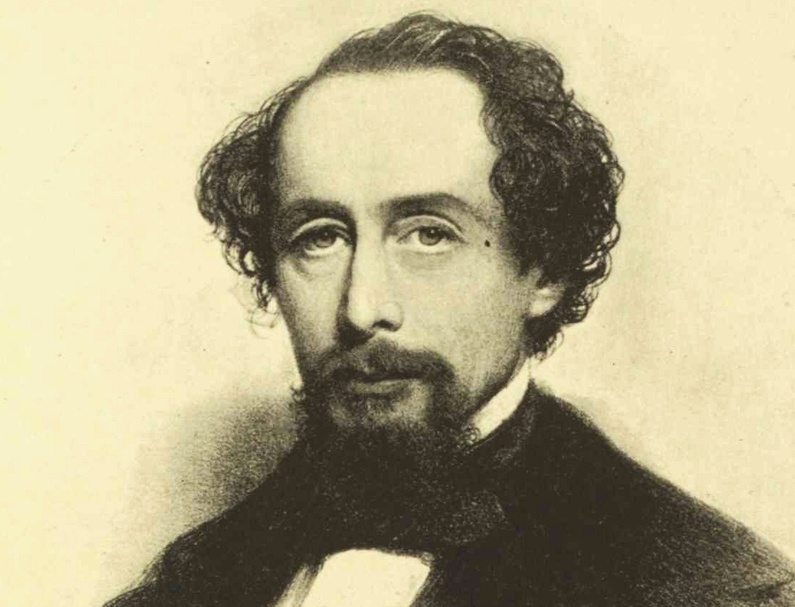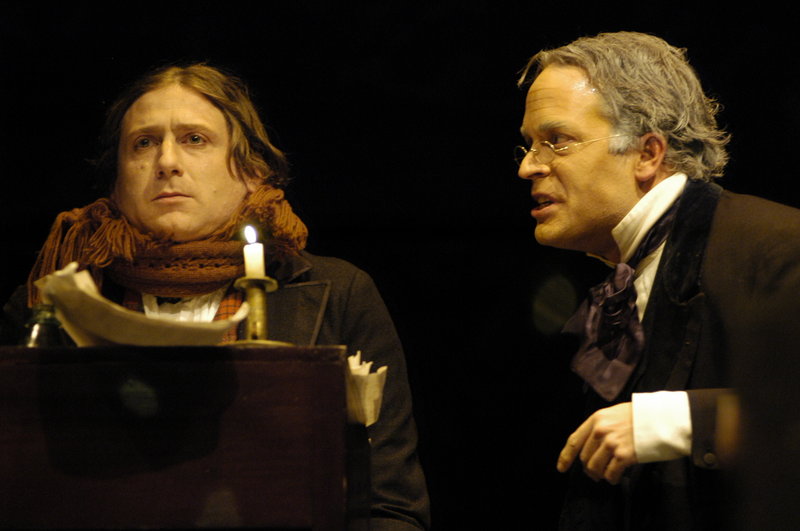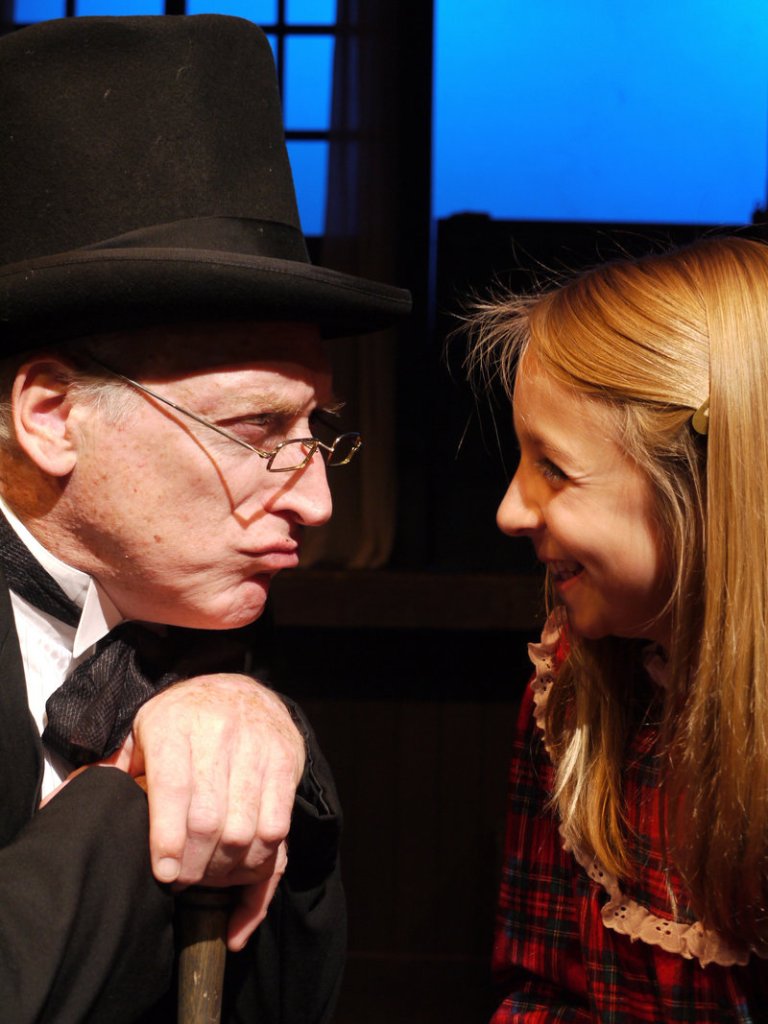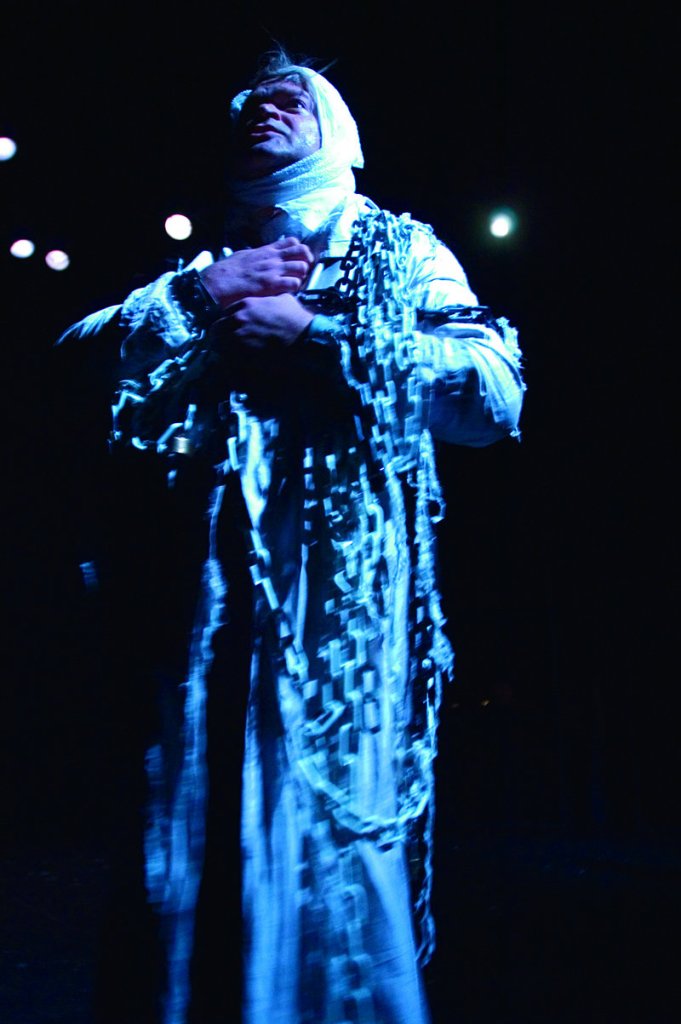One wonders if he were alive today what Charles Dickens would think of Portland.
Certainly, his views were mixed when he visited the city in March 1868 to read from his novel “A Christmas Carol.” The monumental English writer complained of the cold climate, the bland food and the general inhospitable nature of his accommodations at the Preble House.
On the other hand, he enjoyed a walk along the Eastern Promenade and was impressed with the “astonishing energy” of the 1,250 or so people who heard him read on the evening of March 30, 1868, at the old City Hall Auditorium.
Dickens and his celebrated Christmas story have returned to Portland Stage Company after a hiatus last year. The Portland Stage production is one of several versions of Dickens’ story on stages across the region this season.
Portland Stage artistic director Anita Stewart has slightly recast the play, adding musical elements and a few fresh faces. But its core message remains taut and focused: It is a story of the redemption of Ebenezer Scrooge and of giving dignity to the poor. It is a story of the true spirit of Christmas, and one “that needs to be told,” Stewart said.
Dickens wrote the novella in 1843, and it was instantly popular, both in print and on stage. Several stage adaptations were quickly readied.
Dickens, who fancied himself as much an actor as writer, toured frequently to read from the book. One of those tours brought him to Portland in the waning years of his life. He died at age 58 in March 1870.
This year is the 200th anniversary of his birth.
Although the Victorian novelist may be best known in America for “A Christmas Carol,” scholars and critics generally cite “A Tale of Two Cities,” “The Pickwick Papers” or “David Copperfield” as greater literary accomplishments. He was very much a social critic, who used his novels as a way to advance his views and agenda.
He arrived in Boston in November 1867, facing the prospect of 80 readings over five months. The itinerary presented logistical challenges, as that winter brought piles of snow and deep cold. He used Boston as a base, and traveled mostly by rail to regional cities.
His agents scheduled trips as far south as Washington, D.C., and west to Chicago. But his schedule was truncated because of the weather, and Dickens never made it west of Buffalo. With the cancellations, Portland was added to his itinerary late in the tour.
He did not have a great time in Portland. Because of restrictive train schedules, he had to leave Boston on Saturday night for his Monday reading. There was no rail service on Sunday.
He arrived late on Saturday night, and walked from the train depot at the foot of State Street to his lodgings at the Preble House at Congress and Preble.
His first night in town was miserable. He complained of coughing from “two or three in the morning until five or six, and have been absolutely sleepless. I have no appetite besides, and no taste.”
He observed that “the life in this climate is so very hard” and talked of depression and fatigue. To a travel companion, he said the next day, “I am nearly used up.”
He found the food at the Preble House “bad and disgusting.”
HIS FIRST FULL DAY in town, on Sunday, he kept mostly to himself, venturing out of his room only for a short walk. Monday, the day of his reading, was a better day. He took a long walk by the sea, presumably to the Eastern Promenade based on his description of Casco Bay. He also noted that Portland was rebuilding after a devastating fire two years before. He mentioned seeing charred trees and much evidence of reconstruction.
Given the city’s rebuilding process, the turnout of 1,250 or so people impressed him. Tickets cost $2 each.
“Yet such is the astonishing energy of the people that the large hall in which I am to read tonight … would compare very favorably with the Free Trade hall at Manchester,” he wrote, according to a research paper that appeared in the Colby Library Quarterly in 1962.
The reading went well. The response was enthusiastic, and Dickens termed his appearance “triumphant” – although cynics wondered if his enthusiasm was owed more to his paycheck than to any feeling of artistic accomplishment.
One can presume Portland meant something to Dickens, as he and Henry Wadsworth Longfellow were close friends. Dickens visited the Portland-born poet at his home in Cambridge, Mass. But Portland may well have been just another stop near the end of a very long and tiresome tour.
By all accounts, Dickens had stature equivalent to a modern-day pop star. The local news media chronicled his arrival and departure, and noted his movements around town.
Indeed, the morning after his reading in Portland, a local girl snipped a piece of fringe from his shawl as a keepsake as Dickens walked back to the train station for his return to Boston.
Darrell Bulmer of the Maine Arts Commission has long admired Dickens and his work. An Englishman, Bulmer grew up about 60 miles outside of London, and studied Dickens in college.
“I looked upon Dickens as a one-man ‘Occupy Parliament’ movement,” said Bulmer, who saw the Portland Stage production of “A Christmas Carol” last week. “He was the Jon Stewart of his day. Using a mixture of powerful writing and humor, he had the courage to speak out against social injustices. Unions were not sanctioned during this period in history, and Dickens provided a voice for the masses.”
Bulmer appreciates the many productions of “A Christmas Carol” that are available in Maine and elsewhere. It is an important piece of literature with a message that is universal across time, culture and classes.
“Throughout the novel, Dickens addressed the poor treatment of the working class while trying to remind his readers of the traditional meanings of Christmas in England,” Bulmer noted. “Dickens wrote the novel at a time when new methods of celebrating Christmas were being introduced, such as the Christmas tree, cards and even caroling. Today we hear disgruntled comments that Christmas has become too commercialized and the true meaning has been lost. It appears that Dickens had those same concerns.”
Staff Writer Bob Keyes can be contacted at 791-6457 or:
bkeyes@pressherald.com
Twitter: pphbkeyes
Send questions/comments to the editors.







Success. Please wait for the page to reload. If the page does not reload within 5 seconds, please refresh the page.
Enter your email and password to access comments.
Hi, to comment on stories you must . This profile is in addition to your subscription and website login.
Already have a commenting profile? .
Invalid username/password.
Please check your email to confirm and complete your registration.
Only subscribers are eligible to post comments. Please subscribe or login first for digital access. Here’s why.
Use the form below to reset your password. When you've submitted your account email, we will send an email with a reset code.